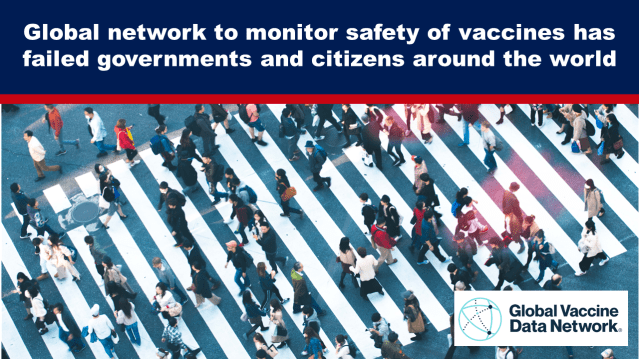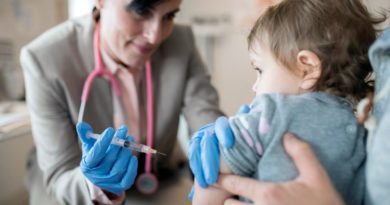Global network to monitor safety of vaccines has failed governments and citizens around the world
Three years ago, the Global Vaccine Data Network (“GVDN”) was granted unfettered access to health records by numerous governments. Yet, GVDN has failed to produce any full and meaningful analysis of covid vaccine injuries.
There is a need for a comprehensive health service audit, Dr. Guy Hatchard says. “It is time for governments to insist that health services provide them with up-to-date information on the extent of healthcare usage and all-cause mortality, and that also needs to be related to covid vaccine status.”
What is GVDN?
GVDN is a global partnership to monitor the safety and effectiveness of vaccines across hundreds of millions of people rather than just the tens of thousands involved in large clinical trials. As of early 2023, the GVDN covers 31 sites in 26 countries across six continents, representing more than 300 million people.
It is a member of the World Health Organisation’s (“WHO’s”) Vaccine Safety Net which means it has been evaluated by WHO and meets WHO’s Global Advisory Committee on Vaccine Safety (“GACVS”) criteria for “good information practices.”
GVDN received seeding money from the Gates Foundation in 2019. According to an extract from a GACVS meeting in June 2019:
GACVS was informed about a new global vaccine data network (GVDN) … An inaugural meeting was held in Annecy (France) in January 2018* … Representatives from academia, research centres, industry and GAVI in 16 countries in all 6 WHO regions attended.
[Note: GVDN’s website states that the inaugural meeting was held in January 2019.]
The meeting reached agreement on a collaborative model for conducting studies of vaccine safety, efficacy and risk-benefit; a governance model that ensures full participation of sites and efficient development of study protocols; data models to protect individual privacy but allow collaborative agreements on common data models (standardization of data to allow pooling of results); and a pilot study to investigate the link between influenza vaccines and Guillain–Barré syndrome.
The advantages for countries would be access to the entire GVDN. [GACVS] also considered that the regulatory imperative for post-licensure surveillance could sustain support for a GVDN through a common pool. The requirement for this type of active surveillance in GAVI-eligible countries as a condition for receiving vaccines could drive capacity-building in those countries.
Use of distributed data networks, World Health Organisation, 2019
In April 2021, the GVDN received significant funding from the US Centres for Disease Control and Prevention (“CDC”) for the project over three years, entitled Global Covid Vaccine Safety (“GCoVS”). In August 2022, the CDC granted additional funding to extend the GCoVS project by two years and expand the number of sites participating globally.
GVDN relies on research grants for specific vaccine safety monitoring projects and is hosted by UniServices, a not-for-profit stand-alone company that is wholly owned by the University of Auckland. Funding for New Zealand-focused research has been received from Te Whatu Ora Health New Zealand, previously the New Zealand Ministry of Health.
Let’s not lose touch…Your Government and Big Tech are actively trying to censor the information reported by The Exposé to serve their own needs. Subscribe now to make sure you receive the latest uncensored news in your inbox…
The Need for a Comprehensive Health Service Audit
Two papers published this week present starkly contrasting views of the scientific process. Dr. John Gibson economist at the University of Waikato, published ‘Cumulative excess deaths in New Zealand in the Covid-19 era: biases from ignoring changes in population growth rates’ whereas the Global Vaccine Data Network published ‘Covid-19 vaccines and adverse events of special interest: A multinational Global Vaccine Data Network (GVDN) cohort study of 99 million vaccinated individuals’ whose contributors included Dr. Helen Petousis-Harris of the University of Auckland.
The second paper made headlines in newspapers all around the world, see for example ‘Two very rare Covid vaccine side-effects detected in a global study of 99 million’ in The Guardian. The Guardian article and most others highlighted the use of the word “rare” in the paper when referring to adverse events and translated this into a bold endorsement of covid vaccine safety saying:
Results confirm how uncommon known complications are as researchers confirm benefits from vaccines still ‘vastly outweigh the risks’. [Emphasis added]
The use of quotation marks implies that the phrase was lifted directly from the paper. It wasn’t. The paper made the same mistake we have referred to in the last three releases of the Hatchard Report. It was a disease-specific assessment of safety. It looked at a list of just 13 specific diseases and assessed whether their occurrence following vaccination was higher than the established background rate of these conditions in the general population pre-pandemic. It did not investigate any effect on all-cause mortality, the measure most likely to assess safety or risk.
In the event, rather than confirming benefits, it found the incidence of Guillain-Barré syndrome, cerebral venous sinus thrombosis, myocarditis, and pericarditis were related to covid vaccination as previously admitted, but also found an increased incidence of acute disseminated encephalomyelitis or acute brain or spinal inflammation following the first dose of Moderna’s mRNA-1273 vaccine.
It also cautiously noted that: “Other potential safety signals that require further investigation were identified.” It did not adequately deal with the known under-reporting of conditions following covid-19 vaccination, and whilst using the term “cardiovascular conditions,” it only investigated myopericarditis occurrence, not the incidence of heart attacks, nor did it look at cancer rates.
Therefore, the authors prejudged the issue by looking at a very limited pre-selected list of conditions, the same discredited method employed by health authorities around the world, including New Zealand, to minimise the significance of and dismiss the avalanche of reports of post-vaccination injury. In other words, they supposed there were just a few conditions that could be related to vaccination, thereby refusing to acknowledge the unprecedented increases in all-cause mortality brought about by unusual increases in a very wide range of conditions.
Gibson’s paper is tightly focused on correcting the methodology used by Michael Baker and others to claim that New Zealand has had a net fall in all-cause mortality since the start of the pandemic. A claim that has been widely reported by politicians and the media in an attempt to reassure the public.
Gibson shows that the methods used to project New Zealand’s population assumed a rising population, which was not the case due to border closures. When the actual population is taken into account, cumulative all-cause mortality rose by 4% between 2020 and 2022 and then rose by around 8% in 2023. Gibson points out this is not statistically distinguishable from comparable countries such as Denmark.
Gibson notes, “Accurate health and economic data are needed to evaluate policy responses to covid-19. A potentially comprehensive health indicator is excess deaths.” His paper confirms excess deaths are rising and thereby casts doubt upon current health policy decision-making.
So How Should the Authorities Respond?
Clearly, hospitals and emergency departments are overwhelmed. Health Service New Zealand publicity keeps emphasising the importance of covid boosters, but what if covid boosters are a part of the problem or even the main culprit? Whether this is the case or not, the government has no clear idea of what specific health conditions are driving the health crisis. Any attempt to alleviate the situation will require an accurate audit of healthcare usage by age and condition and a corresponding analysis of all-cause mortality.
Three years ago, the New Zealand government and other governments around the world granted the Global Vaccine Data Network (“GVDN”) unfettered access to their health data and statistics. The paper published this month by GVDN shows just how miserably GVDN has let them down. It failed to ask any questions that would detect any long-term effects of the covid vaccines.
It is time for governments to insist that health services provide them with up-to-date information on the extent of healthcare usage and all-cause mortality, and that also needs to be related to covid vaccine status.
A YouTube video by Dr. John Campbell details the extent of the problem and makes the compelling observation that excess mortality is a problem in highly vaccinated countries including Canada, the USA, the UK, Australia, New Zealand, Denmark, Finland, Germany, Ireland, Japan, Netherlands, South Korea and Taiwan, but non-existent in nations with low vaccination rates including Bulgaria, Romania and Hungary.
There is a popular saying in India: “Truth Alone Triumphs.” This is echoed in various forms in cultures around the world including Shakespeare’s “Truth Will Out.” Truth, by its nature, is what it is; it exists independent of anyone’s opinion or whim. As such, it is eternal. Despite the growing tendency to believe that reality is what I think it is, truth surfaces over time. This statement reflects the cosmic order, which is so vast and inviolable that no person or government can swim against its tide for any but a short time.
Instead of relying on political rhetoric, lobbyists, foreign commercial interests, or consultants, the government needs to order a comprehensive audit of our health statistics, and then the truth will out.
About the Author
Guy Hatchard, PhD, is a New Zealander who was formerly a senior manager at Genetic ID a global food testing and safety company (now known as FoodChain ID). He is the author of ‘Your DNA Diet: Leveraging the Power of Consciousness To Heal Ourselves and Our World. An Ayurvedic Blueprint for Health and Wellness’.
You can subscribe to Dr. Hatchard’s websites HatchardReport.com and GLOBE.GLOBAL for regular updates by email. GLOBE.GLOBAL is a website dedicated to providing information about the dangers of biotechnology. You can also follow Dr. Hatchard on Twitter HERE and Facebook HERE.

This article has been archived for your research. The original version from The Exposé can be found here.



